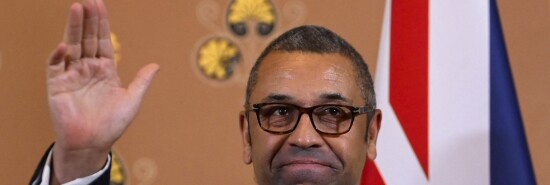
UK offers pathetic response to Chinese diplomats’ attack, sending bad signal for US special relationship
Tom Rogan
The British government showed alarming deference to China on Wednesday when it absurdly claimed to have shown strength as Beijing withdrew diplomats involved in an attack on pro-democracy protesters.
The October attack occurred outside and within China’s Consulate in the English city of Manchester. It was serious, involving one protester being dragged into the consulate grounds and beaten. The conduct of China’s diplomats represented an outrageous breach of both diplomatic convention and English law. And its Manchester Consul-General Zheng Xiyuan was directly involved. In response, British police requested that China waive diplomatic immunity for the officials involved so that they could be interviewed. China refused. But rather than immediately expelling the diplomats in response, Prime Minister Rishi Sunak’s government has since sat idle. That takes us to Wednesday.
Responding to the withdrawal, Foreign Minister James Cleverly claimed that China’s belated action “demonstrates that our adherence to the rule of law, the seriousness with which we take these incidents has had an effect.”
Wrong. Actually, foreign secretary, it demonstrates that China is right to sense a British government that is malleable to its pressure. Senior backbench parliamentarian and former Conservative Party leader Iain Duncan Smith (who wrote for the Washington Examiner last week), put it aptly to the BBC: “We should have kicked them out weeks ago.”
BIDEN’S TALK WITH XI WAS GOOD; HIS TEMPTING OF FATE IS BAD
The U.K.’s weak response should concern supporters of the U.S.-U.K. special relationship. After all, it comes alongside increasing signs that Sunak’s government is backing away from the tougher stance Sunak had adopted while campaigning to become prime minister over the summer. Back then, Sunak described China as Britain’s “No. 1 threat.” That assessment echoes the view of Britain’s domestic intelligence service MI5 and its signal intelligence service GCHQ.
Instead, Sunak is now returning to the conciliatory tradecentric strategy he adopted toward China while serving as chancellor of the exchequer. Since becoming prime minister on Oct. 25, Sunak has shown increasing signs of appeasement. He arranged an audience with Xi Jinping at the recent G-20 summit in Bali, only for that meeting to be canceled by Xi when he sensed Sunak’s desperation for that meeting. Beijing wants Sunak to copy Olaf Scholz and Emmanuel Macron in understanding that trade benefits first require prostration. Sunak has also abandoned his identification of China as Britain’s “No. 1 threat.” Questioned on this abandonment by the BBC on Sunday, Cleverly’s discomfort was visible.
This weakness matters. At every level of governance — diplomatic, economic, intelligence-related, and military — China poses an extraordinary threat to the survival of the U.S.-led democratic order. Whether it’s Uyghur genocide in Xinjiang, endemic intellectual property theft, or threats to subjugate Taiwan and the South China Sea, China’s challenge is clear. Democracies such as Britain have every right to pursue whatever foreign policy they desire. But the U.S. must now prioritize relationships with allies that align with U.S. efforts to defend the post-1945 democratic order.
Put simply, if Britain separates itself from U.S. efforts to constrain Chinese imperial aggression, the special relationship will no longer be very special.
CLICK HERE TO READ MORE FROM THE WASHINGTON EXAMINER
